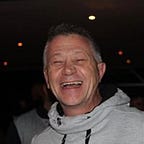My name is not Frans.
Most people know me as ‘Frans.’ It’s what my parents called me, my family all call me ‘ Frans,’ and it’s how I would have introduced myself to friends, teachers, employers, colleagues, clients, suppliers, and everyone I have ever met.
In Shakespeare’s, Romeo and Juliet, the Montague’s and Capulet’s are families at war. Romeo was willing to reject his father’s Montague name, to be Juliet’s lover. Juliet responds by saying:
“What’s in a name? That which we call a rose by any other name would smell as sweet.”
She is suggesting that she loves the man called, ‘ Montague,’ and not the family or the name itself. Herein lies the central theme of the tragic play.
My French ancestors fled from religious persecution in the mid-1600s. The French Huguenots were Protestant members of the Calvinist Reformed Church. By 1692, 201 Huguenot families had settled at The Cape of Good Hope. Thousands of others fled France to countries such as Switzerland, Germany, The Netherlands, America, England and Poland, where they could practice their religion freely.
My full name is Gerhardus Francois Nel.
Exactly why my parents decided to call me by my abbreviated second name, is not clear. But that choice helped shape the person I’ve become.
My parents grew up in a small town called Pofadder in the Northern Cape, where English was hardly heard or spoken. Most of the population spoke only Afrikaans, and the schools did not expose learners to much English material. My mom and dad came to Johannesburg after high school. My mom started her training at a nursing college and my dad joined the South African Airways as an apprentice technician. Much to their disappointment, all the study material was in English. They had to learn how to read, write and speak English if they hoped to succeed.
Those early years while they were both struggling to understand the English terminology in their respective fields, they swore if they ever had children one day, they would not allow them to suffer as they had. Thus, all four of us were sent to English schools. Growing up, us kids would speak English to each other and to my parents, while my parents would answer us in Afrikaans. As time passed, so less and less Afrikaans was spoken, even my parents eventually only spoke English to each other. Today, the only Afrikaans we are exposed to is church and our Afrikaans speaking friends and family.
Since their first encounter, the British and the Boers were at loggerheads. The Boers seeing that the British colonizers were only interested in expanding their territories, stood firm against British colonial rule. In the First Anglo Boer War of 1880, the Boers of the Transvaal Republic held off the British to keep the independence of Transvaal under Boer rule. But, tensions never subsided, as the British insisted on incorporating Transvaal into the rest of the colonised Republic of South Africa. Ultimately it resulted in the outbreak of the Second Boer War in 1899, which the British won.
Since those early days, animosity between English and Afrikaans speaking South Africans took root, with both sides calling each other derogatory names with a deep disliking of one another. Today, although there are still remnants of mistrust among the older generations, the new generations have thankfully abandoned their hatred.
There is an interesting phenomenon called The Cocktail Party Effect. When you are at a cocktail party with hundreds of guests, someone mentioning your name, even if it’s across a noisy room, will get your attention. It turns out we are ‘tuned in’ to our name, it is the one word we have heard directed at us more than any other. Our name is how we introduce ourselves to the world and how we identify ourselves. We gather our first impressions on hearing someone’s name, and often make associations or form judgments based on our interpretation. We not only identify with our own name, but we have a bias towards people with names we can associate with. Research has shown that we particularly like the first letters of our names, with a more than 50% likelihood of choosing one out of the alphabet.
The name, ‘Frans,’ although still a traditionally Afrikaans name, is easy to pronounce in English. ‘Gerhardus’ is harder to pronounce with its distinctly Afrikaans heritage. ‘Frans’ sounds more approachable and less formal. But, as I grow older, I have come to love my full name and embrace it for the legacy and heritage it carries.
So, today, if someone calls out, ‘Gerhardus’ in a crowded room, I will respond with the same excitement as ‘ Frans.’
A rose by any other name would smell as sweet.
Have an awesome weekend!
Originally published at https://www.leapfirst.co.za on July 26, 2020.
